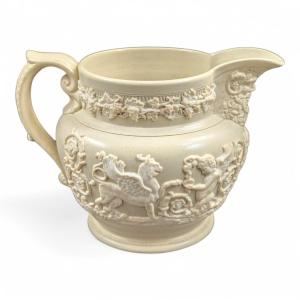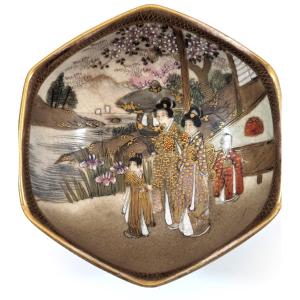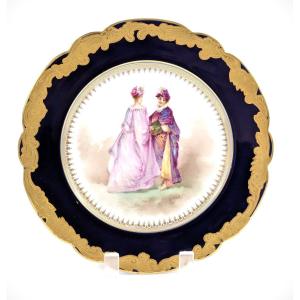These delightful pieces showcase the finest craftsmanship of the Derby factory. The boy is dressed in a hand-me-down jacket of fine quality adorned with richly gilded buttons. However, his disheveled appearance is highlighted by torn jacket sleeves, a tear in the midsection, and a hole in the toe of his shoe, adding character to his portrayal. Despite his worn attire, the boy appears to be healthy, with rosy cheeks and chubby arms. Amusingly, his expression resembles that of a young Trump.
The girl holds a wooden bowl, eating ‘curds-and-whey’ with a wooden spoon. Her patched dress, particularly at the back, enhances the rustic charm of the figurines. Both characters stand on grassy mounds adorned with tree stumps and scattered flowers. These rare figurines are marked with the number 101 on the underside, confirming their Derby factory origin. The three "patch marks" on the base correspond to the time of manufacture.
The Derby Porcelain Factory, established in the mid-18th century in Derby, England, became one of the most esteemed English porcelain manufacturers of its time. Its "patch period," roughly spanning the 1750s and 1760s, is named after the distinctive "patch marks" found on the bases of figures, used to hide supports during firing. During this era, the factory produced highly sought-after figurines, particularly of pastoral scenes and characters from the popular ‘Commedia dell'arte.’ These pieces were celebrated for their exceptional detail, vivid colors, and lively expressions, often rivaling the quality of German (Meissen) and Sèvres porcelains. The patch period remains a celebrated phase in Derby's history, representing the pinnacle of craftsmanship and a unique collectible category for enthusiasts of English ceramics.
Dimensions:
Height of each figurine: 12.5 cm.
Condition:
Please study the accompanying photographs carefully, as they form an integral part of this description. The item will be shipped with full tracking and insurance. Shipping costs include labor, packaging, and postage.








































 Le Magazine de PROANTIC
Le Magazine de PROANTIC TRÉSORS Magazine
TRÉSORS Magazine Rivista Artiquariato
Rivista Artiquariato